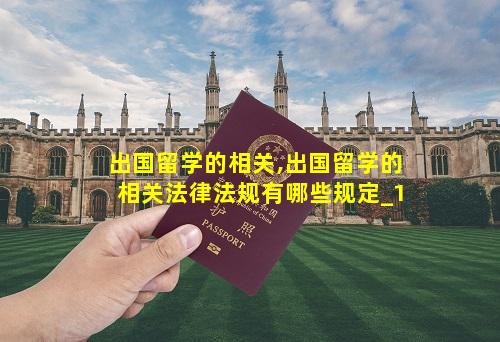 锦泰留学网
锦泰留学网出国留学是指学生或研究人员选择到其他国家接受教育或进行学术研究的过程。出国留学的相关内容包括以下几个方面:
1. 申请流程:了解并完成申请材料的准备工作,包括填写申请表、提供个人简历、推荐信、成绩单等。
2. 签证与手续:根据目标国家的要求申请学生签证,提供所需材料并完成相关手续。
3. 选校与专业:根据自身兴趣与目标,选择适合自己的留学国家、学校和专业。
4. 费用与奖学金:了解留学费用的构成,并规划好自己的经济支出。同时,探索和申请可能的奖学金和助学金。
5. 语言要求:根据目标国家的语言要求,准备并参加相应的语言考试,如TOEFL、IELTS等。
6. 文化适应:熟悉目标国家的文化和习俗,了解当地的社会、法律和生活环境。
7. 住宿与生活:了解目标国家的住宿和生活费用,安排好自己的住宿和生活。
8. 学习与研究:适应新的学习环境,参与课程学习或进行科研工作。
9. 生活安全与保健:了解目标国家的医疗保健体系和安全问题,并采取必要的保护措施。
10. 后续发展与就业:留学期满后,根据自身情况决定是否回国或继续留在目标国家发展,并做好就业或深造的规划。
出国留学是一个复杂而多元的过程,需要学生综合考虑自身条件与兴趣,做出明智的决策,并做好充分的准备工作。
出国留学涉及的法律法规包括以下几方面的规定:
1. 国家教育部政策规定:国家教育部会发布有关留学政策的通知和文件,包括留学生的招生、管理和奖助等情况。
2. 国际合作与交流部政策规定:国际合作与交流部制定有关留学生的外事管理政策,负责推动中外留学生的交流与合作。
3. 国务院侨办规定:国务院侨办发布有关侨务政策和留学生的侨务办理规定,负责留学生的侨务工作和服务。
4. 学校留学生招生政策和规定:各高等院校会根据国家和各自的情况制定留学生招生政策和录取标准,包括学历学位的申请条件和程序等。
5. 中国公民境外留学管理办法:该法规对中国公民境外留学的管理进行了明确规定,包括留学出境审批、留学生归国登记、留学生证书认证等方面。
6. 签证、居留与工作相关法规:出国留学需要申请相应的签证和居留许可,不同国家的规定各异,需要了解目标国家的签证、居留和工作政策。
7. 留学生安全、健康和保险规定:留学生在国外期间需要遵守当地的法律法规,保障个人安全和健康,同时需要购买相应的保险。
需要注意的是,在出国留学前,建议咨询相关部门和学校的规定,确保自己了解并遵守相应的法律法规。
出国留学的相关制度主要包括以下几个方面:
1. 签证制度:留学生需要申请并获得目标国家的学生签证才能合法地留在该国就读学业。不同的国家有不同的签证类型和要求。
2. 教育体系:不同国家的教育体系和学位体系有所不同,留学生需要了解目标国家的教育体系,包括学制、学位类型、教育内容和学术要求等。
3. 学费和奖学金:留学生需要了解目标国家的学费标准和支付方式,并且有可能申请奖学金或助学金,在经济方面得到支持。
4. 留学生保险:一些国家要求留学生购买健康或医疗保险,以保障留学生在留学期间的健康和医疗需求。
5. 市场准入制度:一些国家对留学生的市场准入进行限制,留学生需要了解目标国家是否允许在留学期间打工、实习或者就业等情况。
6. 文化交流和语言要求:留学生需要尊重和融入目标国家的文化,了解当地的习俗和礼仪。一些国家对留学生有语言要求,可能需要通过语言考试如TOEFL或IELTS来证明语言能力。
这些制度和要求因国家而异,留学生应根据自身的情况和目标国家的要求进行相应准备和申请。
Going Abroad to Study
Studying abroad is an exciting opportunity that offers numerous benefits to students. It provides a chance to gain a global perspective, experience a new culture, develop independence, and enhance language skills. In this essay, I will discuss the advantages of studying abroad and the challenges that students may face.
Firstly, studying abroad allows students to broaden their horizons. By living and studying in a different country, students are exposed to new ideas, beliefs, and customs, which helps them develop a more comprehensive understanding of the world. They have the opportunity to interact with people from diverse backgrounds, exchange cultural knowledge, and explore different perspectives. This exposure not only enhances their academic learning but also promotes personal growth and maturity.
Secondly, studying abroad provides an immersive language learning experience. Being in an environment where the target language is spoken on a daily basis helps students develop fluency, improve their proficiency, and gain confidence in using the language. They have the chance to practice speaking, listening, reading, and writing skills in real-life situations, which cannot be replicated in a classroom setting. Moreover, language immersion also allows students to learn colloquial expressions, idioms, and cultural nuances, making them more effective communicators.


Furthermore, studying abroad fosters independence and self-reliance. When students go to a foreign country, they are responsible for managing their daily lives, including budgeting, cooking, and navigating the local environment. These practical skills, combined with the ability to adapt to a new culture and lifestyle, help students become more self-sufficient and confident. They learn to be flexible, open-minded, and resilient in the face of challenges.
However, studying abroad also presents some challenges. Adapting to a new culture and language may initially be overwhelming for students. They may experience homesickness, frustration, or loneliness. Additionally, there may be academic differences and challenges such as adjusting to different teaching methods, course structures, or evaluation systems. Despite these challenges, many students find that the benefits of studying abroad far outweigh the difficulties.
In conclusion, studying abroad offers numerous advantages including gaining a global perspective, language immersion, and personal growth. While it may present challenges, the experience of studying abroad is invaluable and equips students with skills and knowledge that can benefit them throughout their lives. Therefore, I encourage students to seize the opportunity to study abroad and embrace the transformation it offers.